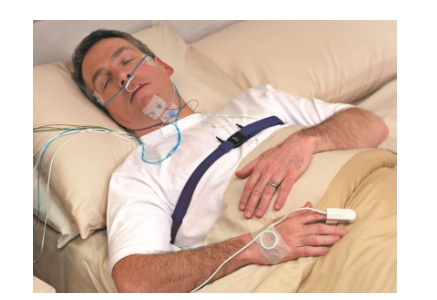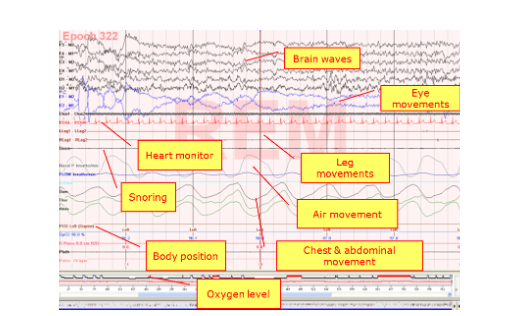By: Geraldus Sigap
Sleep is one of the most critical aspects of our health. It’s when our bodies repair, recharge, and maintain essential functions like memory, immune health, and even mood regulation. However, for many people, sleep doesn’t come easily. Sleep disorders such as sleep apnea, insomnia, and restless legs syndrome can interfere with a good night’s rest. This is where sleep studies, also known as polysomnography, come into play. They are an essential tool for diagnosing sleep-related problems and helping people achieve better sleep and, consequently, better overall health.

Figure 1. Sleep study
In this article, we will explore what sleep study diagnostics are, why they are important, and what you can expect if you undergo a sleep study. Additionally, we will highlight how advanced sleep study facilities like those at RS Abdi Waluyo are helping people find answers to their sleep problems.
A sleep study is a non-invasive test that monitors and records various body functions while you sleep, including brain waves, heart rate, breathing patterns, eye movements, and oxygen levels. The purpose of this study is to identify any disruptions that may be affecting your ability to get restful, restorative sleep.
There are several types of sleep studies, depending on the specific sleep disorder your doctor suspects you may have. The most common type is polysomnography, which provides a comprehensive overview of your sleep cycle and any abnormalities. For instance, it can detect sleep apnea, a condition where breathing repeatedly stops and starts during sleep. Other types of sleep studies include multiple sleep latency tests (MSLT), which measure how quickly you fall asleep, and home sleep tests, which allow for more convenience but provide less detailed data.
Many people suffer from sleep disorders without even realizing it. If you have been feeling tired even after a full night’s rest, or if you have noticed snoring, difficulty breathing at night, or excessive daytime sleepiness, it might be time to consider a sleep study. Here are some common reasons why a doctor might recommend one:
1. Obstructive Sleep Apnea (OSA):
This is a common sleep disorder where your throat muscles relax too much during sleep, blocking your airway and causing breathing interruptions. Loud snoring, choking, and gasping for air during the night are signs of OSA. Left untreated, it can lead to heart problems, high blood pressure, and even stroke.
2. Insomnia:
Chronic difficulty falling or staying asleep can be a sign of insomnia. A sleep study can help determine whether your insomnia is caused by another underlying sleep disorder or behavioral patterns.
3. Narcolepsy:
Narcolepsy is characterized by sudden sleep attacks during the day, even after a full night’s sleep. If you find yourself falling asleep in unusual situations, like while driving or in the middle of a conversation, a sleep study can help diagnose narcolepsy.
4. Restless Legs Syndrome (RLS):
This condition causes an irresistible urge to move your legs, especially at night, which can severely disrupt your sleep. A sleep study can help detect whether your symptoms are affecting your sleep quality.
5. Parasomnias:
Sleepwalking, night terrors, and other abnormal behaviors during sleep fall under the umbrella of parasomnias. Sleep studies help identify these disturbances and can offer insights into potential treatments.
If your doctor recommends a sleep study, you may feel a bit nervous about what it entails. The good news is that the procedure is painless, non-invasive, and designed to be as comfortable as possible. Here’s how to prepare and what you can expect:
- Before the Study: You will be asked to avoid caffeine, alcohol, and naps on the day of the study, as these can interfere with the results. You should also bring comfortable clothing, like pajamas, and any personal items you need to help you relax.
- During the Study: When you arrive at the sleep center, you will be shown to a private room that resembles a hotel room more than a hospital setting. Electrodes will be placed on your scalp, chest, legs, and face to monitor your brain activity, heart rate, and muscle movement. A small clip will be attached to your finger to measure your oxygen levels. While all this may sound uncomfortable, most people adjust quickly and are able to fall asleep.
- After the Study: Once the study is complete, a sleep specialist will analyze the data collected from the test. Your doctor may discuss the results with you after a few days and recommend treatments or next steps.
When the results of your sleep study come in, they will provide a wealth of information about your sleep patterns. Here is a breakdown of what these results can tell you:
1. Sleep Stages:
A sleep study will show how long you spend in each stage of sleep, from light sleep (Stage 1) to deep sleep (Stage 3) and REM sleep, where dreaming occurs. Disruptions in your sleep cycle can explain why you feel fatigued even after a full night’s rest.
2. Breathing Patterns:
If you have sleep apnea, the study will reveal how many times your breathing is interrupted during the night, and how severe the condition is. This data is crucial for determining the best course of treatment.
3. Movement During Sleep:
The study will track any movements you make during sleep, such as leg movements or sleepwalking episodes, which can interfere with your sleep quality.
4. Heart Rate and Oxygen Levels:
Your heart rate and oxygen levels are closely monitored throughout the night. Any drops in oxygen saturation could indicate a serious condition like sleep apnea.

Figure 2. Example of results from sleep diagnostic
For example, untreated sleep apnea can increase the risk of high blood pressure, heart attack, and stroke. In children, sleep disorders can lead to behavioral problems, learning difficulties, and growth issues. By undergoing a sleep study, you can take the first step toward improving your sleep and overall health.
At RS Abdi Waluyo, we recognize the importance of good sleep for maintaining a healthy life. Our advanced sleep study facility is designed to provide you with accurate, reliable results in a comfortable environment. Our team of sleep specialists is experienced in diagnosing and treating a wide range of sleep disorders, from sleep apnea to insomnia. Whether you are struggling with snoring, daytime fatigue, or more serious sleep concerns, our sleep diagnostics can provide you with the answers you need to get back to restful nights. Visit our website or call today to schedule your appointment with one of our specialists.
Resources
- Sleep Study FAQ | Answered by a Registered Polysomnographic Tech [Homepage on the Internet]. [cited 2024 Oct 1];Available from: https://comprehensivesleepcare.com/2020/04/16/sleep-study-faq/
- Understanding your sleep study results [Homepage on the Internet]. [cited 2024 Oct 1];Available from: https://www.dentalsleepmed.gr/english/understanding_your_sleep_study_results-diag-7.html
- Sleep Study: What It Is, What To Expect, Types & Results [Homepage on the Internet]. [cited 2024 Oct 1];Available from: https://my.clevelandclinic.org/health/diagnostics/12131-sleep-study-polysomnography
